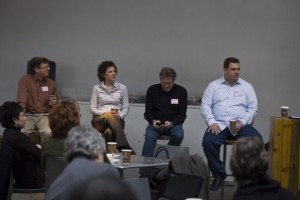
A question about using social media arose this morning — one that I only had time to half-answer. I was on a panel at a Milwaukee Social Media Breakfast (#SMBmke). The question (to paraphrase): “I don’t sell a sexy product. I’m a business that sells to other businesses something that they need. But they don’t necessarily blog about it or tweet about it. Can social media support my goal of lead generation?” I said yes. Below is the second half of my answer.
I did mention The Long Tail. Click through that link to learn what that is. And if you do, think about that link. Jeff Jarvis coined the phrase link economy. Chris Anderson coined the phrase the long tail. I propose a new coinage: the hashtag economy.
The long tail is the book, and the concept, about how niche markets find what they need in a world this isn’t hindered by the economics of brick-and-mortar. There are no carrying costs associated with iTunes offering one more song that just happens to be obscure. Their inventory is limited only by digital storage costs and the bandwidth necessary to deliver the song when someone buys it.
The link economy uses this free, or nearly free, paradigm. It cost me nothing to create the link that pointed readers to an explanation of The Long Tail. The link led to Wikipedia. There again, the power of almost-free. This crowd-sourced encyclopedia saw the most minuscule of incremental costs to provide you with that definition.
The upshot is this. Since we are rewarded nearly every time we click on a link, we do it more often. That generates something that very often can be monetized: Significant volumes of traffic.
Smart businesses — such as the publishers of Wired Magazine and Anderson’s book — leverage this link economy to sell more books. And they leverage The Long Tail Phenomenon in the very sale of a book about the long tail; Anderson’s book might never have become a best-seller if it hadn’t been offered in a virtual bookstore like Amazon first. His readers might have simply been just too darned “niche” to persuade bricks-and-mortar book stores to stock it in their shelves.
Scott Baitinger, co-owner of Streetza Pizza, and I were talking about niche marketing earlier this week. I complimented him on his use of Twitter Hashtags to find a narrow group and to market to them. That narrow group is @FitMKE. Scott has been peddling his pizzas to this group by tweeting to them with the #FitMKE hashtag.
Analog broadcast channels (those based on radio / television wave frequencies) are valuable enough that they are regulated by the government. There are rules about what businesses must do to earn their right to be there (e.g., public service announcements and public-oriented programming). Things that are scarce have value, and these channels are no exception. A recent auction of analog broadcast channels garnered bids in the many millions of dollars.
Twitter handles are not limited by the spectrum of a radio or television broadcast frequency. If I auctioned off my Twitter handle, I would get zero bids. Why? Everyone who knows anything about Twitter knows you can create accounts limited only by the nearly infinite combinations of letters and numbers.
This makes Twitter a spectrum of a nearly infinite number of nearly-free channels. It draws lots of people because it is so cheap and teeming with variety. It uses both the long tail and the link economy.
Increasingly, Twitter is also spawning communities of likeminded people around hashtags. One example of #SMBmke. Another, ironically, is #MKElikemind (another breakfast group — here’s the info on my blog). Scott, and @StreetzPizza, found #fitMKE to be a channel to narrow-cast his offer of healthy pizzas (and also indulgent pizzas, since — hey — you have to be getting fit to enjoy life, don’t you?).
The Hashtag Economy is one way smart marketers are finding their niche audience within the cacauphony of other channels. They’re tuning in, conversing, and doing business there.
Here’s a challenge, especially for my friends (old and new) who attended this morning’s breakfast: What hashtag conversations have you been a part of? And how have they improved your life and work? More important: What business relationships have formed from them?
Related posts:
- Measure clicks and ROI from Twitter posts
- Watching Twitter sell things like pizza and beer
- As long as you’re stuck in traffic, can we talk?
Also mentioned:
